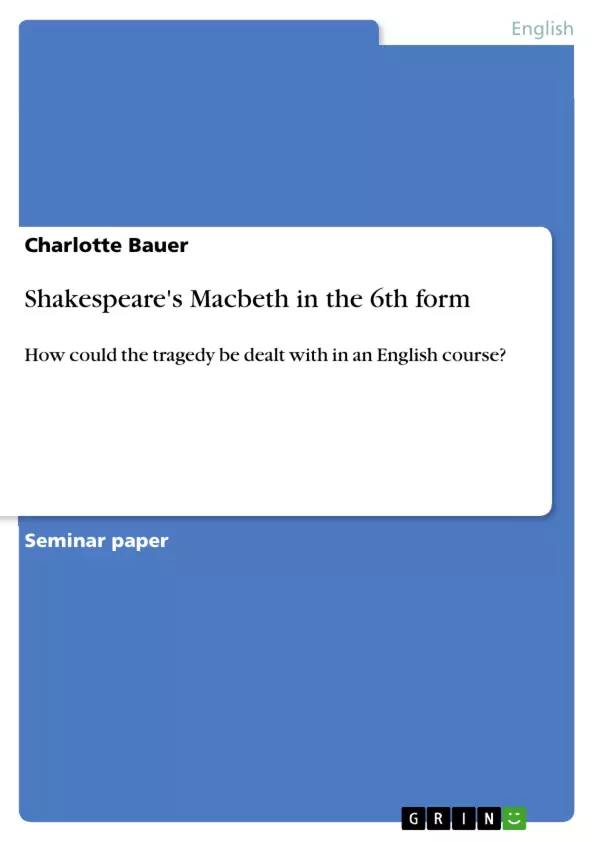The tragedy Macbeth by William Shakespeare is one of the most frequently read plays in English courses in the sixth form; one could say that the implementation of that play has become routine for many English teachers. But every time when something is frequently read, treated or done with routine, one has to bear in mind the danger of not scrutinizing things any more, the danger of taking given interpretations for granted. In order to take these thoughts into consideration, it is necessary to tackle the historical background, the development of the Shakespearean implementation in English courses so that mistakes from the past at dealing with the Bard of Avon are not repeated. Therefore, the first part of this term paper deals with a synchronic and a diachronic view on the Shakespeare implementation in the sixth form.
Table of Contents
- Introduction
- A. General Part: Historical Context of the Shakespeare reception
- 1. Diachronic view on the Shakespeare implementation in the sixth form
- 2. Synchronic view on the Shakespeare implementation in the sixth form
- B. Reading Macbeth: close reading
- 3. Why is Macbeth suitable for implementing it in an English course?
- 4. Introduction to Macbeth/synopsis
- 5. Dramatis personae: characterization of the main protagonists
- 5.1 Characterization of Macbeth
- 5.2 Characterization of Lady Macbeth
- 5.3 Characterization of the antagonists
- 6. Motifs and Themes: fate, witchcraft and supernatural phenomena
- 7. Practical part
- 9. List of references
Objectives and Key Themes
This term paper aims to explore the historical context and contemporary approaches to teaching William Shakespeare's Macbeth in sixth form English courses. The paper examines how the play's implementation has evolved over time and considers why Macbeth remains a suitable text for this level of study. It delves into the play's historical background, characters, themes, and motifs, and proposes practical methods for engaging students in active learning and interpretation.
- The evolution of Shakespeare's reception in sixth form English courses, from a static, one-sided interpretation to a more dynamic and interactive approach.
- The suitability of Macbeth for sixth form students and its enduring relevance.
- The historical context of the Elizabethan world view and its influence on Shakespeare's works.
- Key themes and motifs in Macbeth, such as fate, witchcraft, and supernatural phenomena.
- Modern teaching methodologies that emphasize active student engagement and interpretation.
Chapter Summaries
The introduction presents the context and purpose of the term paper, highlighting the importance of scrutinizing established interpretations of Shakespeare's work. The first part delves into the historical context of Shakespearean implementation in sixth form English courses, examining a diachronic and synchronic view. It explores the shift from a static, one-sided approach to a more dynamic and student-centered methodology influenced by New Historicism, Feminism, and Psychoanalysis. The second part focuses on the suitability of Macbeth for sixth form English courses and provides a synopsis of the play, character analyses, and key themes and motifs. The practical part explores activity- and production-oriented approaches to teaching Macbeth, encouraging students to engage actively with the play and its historical context.
Keywords
The key terms and concepts explored in this term paper include Shakespearean reception, sixth form English courses, Macbeth, Elizabethan world view, themes and motifs, New Historicism, Feminism, Psychoanalysis, activity- and production-oriented teaching methodologies, student engagement, and interpretation.
Frequently Asked Questions
Why is Shakespeare's Macbeth a standard text for the 6th form?
Macbeth offers profound themes such as ambition, fate, and the supernatural, which provide excellent material for complex literary analysis and discussion at an advanced level.
How has the teaching of Shakespeare changed over time?
There has been a shift from static, one-sided interpretations to more dynamic, student-centered approaches that include New Historicism, Feminism, and Psychoanalysis.
What are the main motifs in Macbeth?
Central motifs include witchcraft, supernatural phenomena, blood, and the disruption of the natural order, reflecting the Elizabethan world view.
What is an activity-oriented approach to teaching Macbeth?
It involves students actively engaging with the text through performance, creative writing, or production-oriented tasks rather than just passive reading and analysis.
How does the Elizabethan world view influence the play?
The play reflects contemporary beliefs in the "Great Chain of Being," where regicide (killing a king) was seen as a crime against God and nature, leading to chaos.
- Citation du texte
- Charlotte Bauer (Auteur), 2011, Shakespeare's Macbeth in the 6th form, Munich, GRIN Verlag, https://www.grin.com/document/213771



